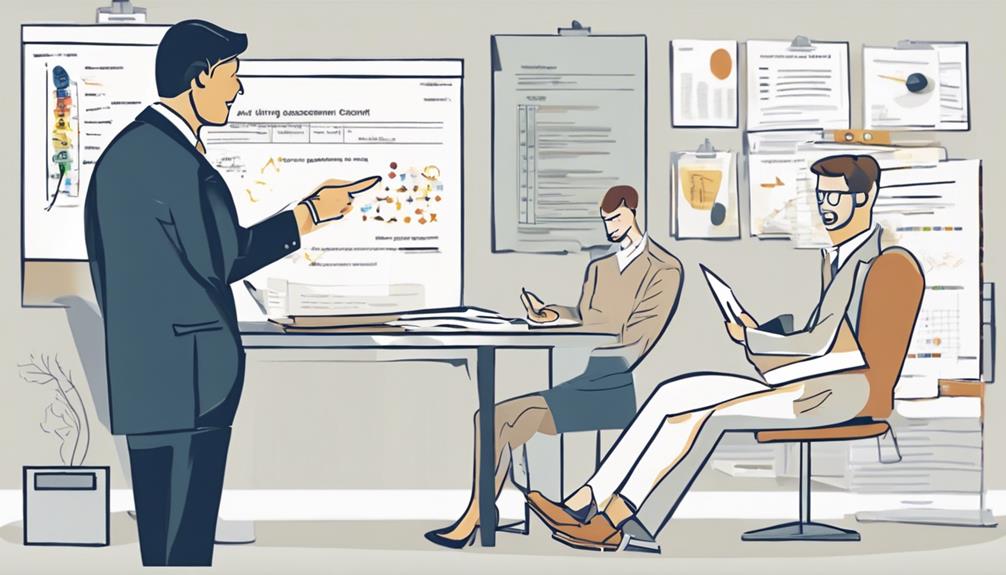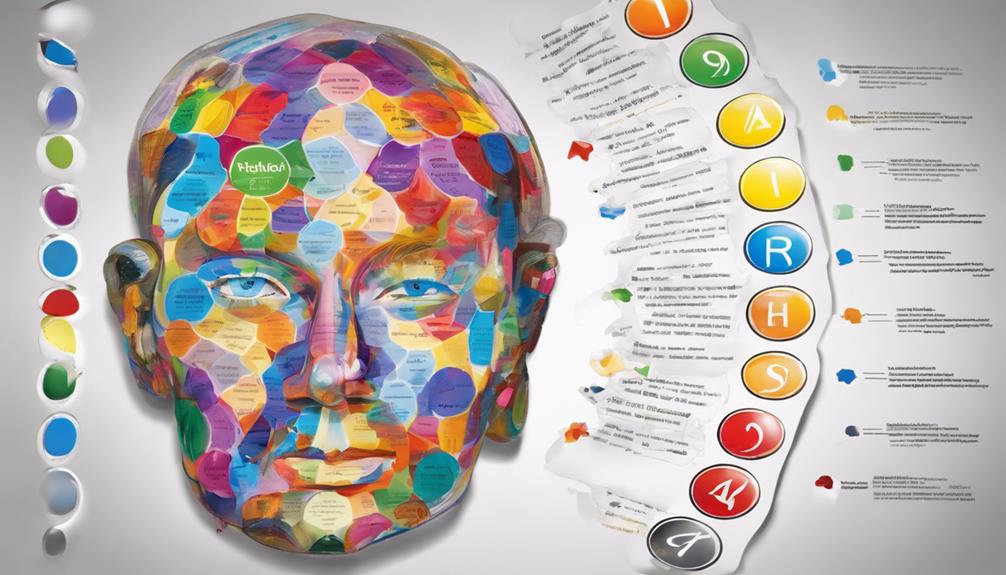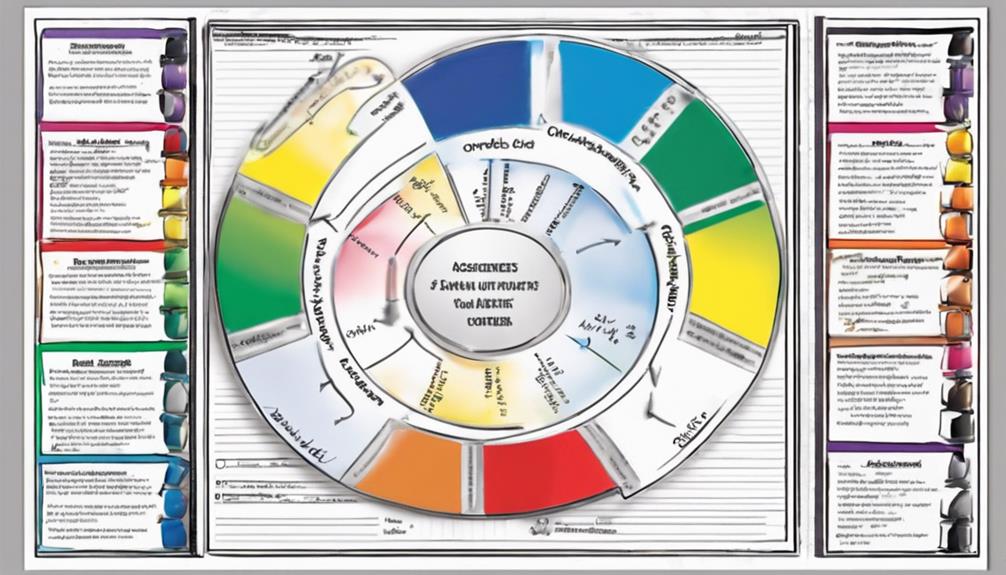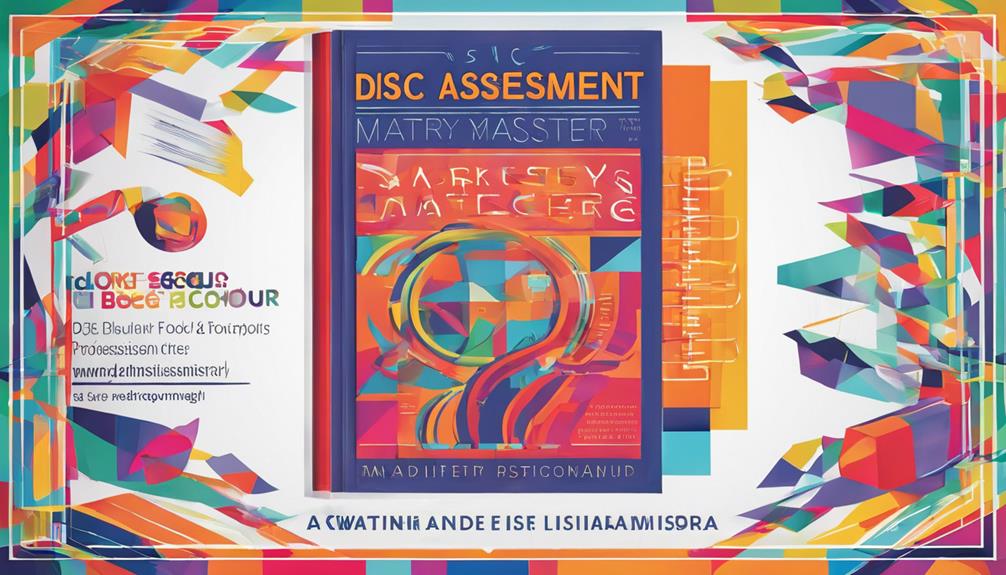As we explore the complexities of perfecting the art of Disc Assessment reviews, we discover ten essential tips that can enhance our evaluation process to achieve greater effectiveness.
By honing in on these key strategies, we can unlock a deeper understanding of individual behaviors and team dynamics, ultimately leading to enhanced organizational performance and cohesion.
Let's explore how these simple yet powerful tips can reshape the way we approach Disc Assessment reviews and drive impactful outcomes in our professional endeavors.
Key Takeaways
- Answer questions authentically to get accurate insights.
- Utilize DISC results for tailored communication strategies.
- Apply insights for improved team dynamics and productivity.
- Implement feedback for personal growth and continuous improvement.
Understanding the DISC Assessment Types
When delving into the realm of DISC assessment types, it's imperative to grasp the fundamental distinctions between Dominance, Influence, Steadiness, and Conscientiousness. The DISC model categorizes individuals based on their behavioral types, offering valuable insights into how they approach tasks, interact with others, and respond to challenges. With up to 12 combinations possible, each person's unique blend of these traits shapes their work style and communication preferences.
By understanding the nuances of each assessment type, employers can gain a deeper understanding of their team members or potential hires. Dominance reflects assertiveness and a focus on results, while Influence indicates sociability and enthusiasm. Steadiness signifies reliability and a preference for teamwork, whereas Conscientiousness highlights precision and attention to detail. Recognizing these traits in individuals can help organizations tailor roles, responsibilities, and communication strategies to maximize productivity and collaboration.
Choosing the right DISC assessment is key to unlocking accurate insights into candidate behavior and ensuring a good fit within the team dynamics and organizational culture. Mastering the distinctions between these assessment types empowers leaders to make informed decisions that drive success.
Tips for Completing the Assessment

When completing the DISC assessment, it's crucial to focus on answering the questions accurately to provide an authentic reflection of your behavioral tendencies. Proper time management strategies should be employed to ensure that you allocate sufficient time for the assessment.
Understanding the results of the DISC assessment is key to gaining insights into your behavioral preferences and tendencies.
Answering Assessment Questions
In preparing to tackle assessment questions, it's crucial to grasp the underlying purpose of each query to craft tailored and impactful responses. Understanding how your DISC traits relate to the job requirements is key in formulating relevant answers.
When addressing assessment questions, it's essential to carefully read and follow the instructions to ensure accuracy. Responses should be supported by concrete examples and specific details that highlight your strengths and behavioral tendencies. By focusing on showcasing these aspects, you demonstrate alignment with the job requirements.
Take the time to consider each question thoughtfully, providing authentic and consistent responses. This approach not only showcases your abilities effectively but also helps assessors gain a clear understanding of your fit for the role.
Time Management Strategies
To effectively manage time during the assessment, ensure to allocate 10-15 minutes for completion, prioritize answering honestly, and utilize provided time-saving features. When aiming for the best DISC assessments and accurate results, implementing strategic time management strategies is crucial. Here are some key tips to help you efficiently complete the assessment:
- Allocate 10-15 minutes for the assessment to ensure ample time for thoughtful responses.
- Prioritize answering honestly and instinctively to yield the most accurate results.
- Quickly prioritize each question to maintain a steady pace and manage time effectively.
- Make use of any time-saving features or tools available within the assessment platform to streamline the process and enhance efficiency.
Understanding Disc Results
For a comprehensive understanding of Disc assessment results, it's essential to delve into the distinct interpretations of Profile I and Profile II, shedding light on individual behavioral tendencies and adjustments.
Profile I reflects the perceived adjustments individuals make in their current environment based on the assessment responses. On the other hand, Profile II represents one's natural behavioral style, which remains relatively stable throughout adulthood.
The gap between the dominant and least comfortable styles in the profile graph provides insight into the clarity of natural style identification.
Debriefing Profile I involves comparing it to Profile II to interpret the adjustments necessary for effective communication and interactions. Understanding one's natural style from Profile II is crucial for developing behavioral action plans and enhancing personal interactions based on Disc assessment results.
Interpreting Your DISC Results

As we interpret our DISC results, it's crucial to understand the various dimensions of the assessment.
By applying these insights to our relationships, we can navigate interactions more effectively.
Leveraging our strengths identified in the assessment can lead to personal and professional growth.
Understanding DISC Dimensions
Understanding the DISC dimensions involves grasping the distinct behavioral traits represented by Dominance, Influence, Steadiness, and Conscientiousness.
- Dominance: Reflects assertiveness and control tendencies.
- Influence: Represents sociability and persuasion skills.
- Steadiness: Highlights patience and collaboration.
- Conscientiousness: Indicates focus on details and quality.
Analyzing the balance and intensity of each dimension in DISC results provides insights into individual preferences and strengths in communication and behavior. By understanding these dimensions, one can tailor communication styles to better suit different individuals, enhance teamwork, and improve overall efficiency.
Mastering the interpretation of these traits allows for a deeper understanding of oneself and others, fostering better relationships and more effective interactions in various personal and professional settings.
Applying DISC to Relationships
Exploring how your DISC results can shape and enhance your relationships provides valuable insights into effective communication strategies tailored to different personality types. Your communication style, as revealed by your DISC assessment, plays a crucial role in fostering positive interactions.
By understanding the dimensions of Dominance, Influence, Steadiness, and Conscientiousness, you can adapt your approach to connect more effectively with others. This knowledge helps in navigating team dynamics, resolving conflicts, and building strong relationships with colleagues, friends, and family.
Leveraging your behavioral styles identified through the DISC assessment allows you to adjust your behavior accordingly, leading to improved communication and collaboration. Applying DISC to relationships empowers you to create meaningful connections and achieve better outcomes based on individual preferences.
Leveraging DISC Strengths
Our DISC results unveil valuable insights into our natural behavioral tendencies and areas where adjustments can be made to enhance communication and collaboration effectively. When leveraging DISC strengths, understanding your communication style and preferred interaction methods is crucial.
Here are four ways to optimize your DISC strengths for improved team collaboration and self-awareness:
- Identify Your Dominant Traits: Recognize your primary DISC traits to understand how you naturally approach tasks and relationships.
- Adapt Communication Strategies: Tailor your communication style based on your DISC strengths to effectively engage with team members.
- Enhance Self-Awareness: Use your DISC results to gain a deeper understanding of your behaviors and their impact on others.
- Maximize Team Dynamics: Apply your DISC strengths in team settings to enhance performance and foster positive relationship dynamics.
Applying DISC Insights in Communication

Applying DISC insights in communication offers a valuable framework for navigating diverse behavioral styles and enhancing interpersonal interactions. By understanding different communication styles based on Dominance, Influence, Steadiness, and Conscientiousness, teams can tailor their interactions for more effective communication. This leads to improved team collaboration, reduced conflicts, and overall enhanced productivity. Adapting communication approaches to various personality types based on DISC assessments provides actionable tips for fostering better relationships within the team.
| Communication Style | Description | Tips for Effective Communication |
|---|---|---|
| Dominance | Direct, decisive, assertive | Be concise, focus on facts, and avoid excessive small talk. |
| Influence | Enthusiastic, sociable, persuasive | Provide opportunities for social interactions and allow for creative input. |
| Steadiness | Patient, reliable, cooperative | Acknowledge their efforts, be genuine, and ensure a stable environment. |
Understanding and applying DISC insights in communication not only improves teamwork but also strengthens relationships and boosts overall team performance.
Leveraging DISC for Team Dynamics

Navigating team dynamics effectively involves harnessing the insights gained from DISC assessments to optimize collaboration and productivity. When leveraging DISC for team dynamics, it's crucial to consider the following:
- Understanding Individual Behavioral Styles: DISC assessments provide valuable insights into how team members operate, allowing for a better understanding of their strengths and communication preferences.
- Improving Communication Practices: By knowing each team member's DISC profile, communication can be tailored to suit their style, leading to clearer and more effective interactions.
- Resolving Conflicts and Fostering Harmony: Utilizing DISC assessments can help identify potential sources of conflict within a team and provide strategies to address them, promoting a harmonious work environment.
- Optimizing Team Productivity: Actionable insights from DISC tests enable teams to work more cohesively, leveraging each member's strengths and enhancing overall productivity.
Setting Development Goals With DISC

When utilizing DISC assessment results, it's essential to strategically set specific and measurable development goals to enhance professional growth. Begin by analyzing your DISC assessment results to identify areas for improvement and leverage your strengths effectively.
Tailor your development goals to align with your behavioral tendencies as indicated by the assessment. Focus on enhancing communication, collaboration, and leadership skills according to your DISC style. For example, if you're a high 'D' (Dominance), you may set a goal to work on listening skills to improve communication with others. Conversely, if you're a high 'S' (Steadiness), you could focus on assertiveness to enhance your leadership abilities.
Remember to make your goals SMART (Specific, Measurable, Achievable, Relevant, Time-bound) to ensure clarity and effectiveness in your development plan based on your DISC assessment results.
Handling Feedback From the Assessment

Understanding how to interpret feedback from a DISC assessment is crucial for individuals seeking to enhance their professional growth and interpersonal effectiveness. When handling feedback from the assessment, consider the following key points:
- Embrace Insights: Feedback from a DISC assessment offers valuable insights into your communication styles and behavioral tendencies, providing a deeper understanding of how you interact with others.
- Identify Areas for Growth: Feedback highlights both your strengths and areas for development based on the assessment results, allowing you to focus on enhancing specific skills or behaviors.
- Enhance Communication Skills: By understanding and applying the feedback received, you can improve your communication, conflict resolution, and collaboration skills in various interpersonal situations.
- Leverage Natural Preferences: Effective interpretation of feedback enables you to leverage your natural behavioral preferences for success, guiding you towards utilizing your strengths in professional settings to achieve optimal outcomes.
Mastering the art of handling feedback from a DISC assessment can significantly impact your personal and professional development by enhancing your self-awareness and ability to work effectively with others.
Integrating DISC Into Leadership Practices

Upon receiving feedback from a DISC assessment, leaders can leverage insights into communication styles and behavioral tendencies to enhance their leadership practices effectively. Understanding team members' DISC profiles is crucial for tailoring communication and coaching strategies. By integrating DISC into leadership practices, leaders can improve team collaboration, conflict resolution, and overall performance. Adapting leadership styles based on DISC assessments allows leaders to better meet the diverse behavioral preferences of their team members. This fosters a more inclusive and supportive work environment by recognizing and appreciating individual differences.
| Benefits of Integrating DISC Into Leadership Practices | ||
|---|---|---|
| Tailored communication and coaching strategies | ||
| Improved team collaboration and conflict resolution | ||
| Adapting leadership style to suit team members' preferences |
Integrating DISC into leadership practices is essential for effective leadership and team management. It enhances communication, fosters collaboration, and promotes understanding among team members, leading to a more cohesive and productive work environment.
Enhancing Self-Awareness Through DISC

By reflecting on our behaviors and recognizing our dominant traits through DISC assessments, we can gain valuable insights into our communication styles and interpersonal interactions.
Understanding our behavioral tendencies allows us to tailor our communication strategies effectively, fostering better relationships and personal growth.
With increased self-awareness from DISC, we can navigate challenges, conflicts, and stressors with resilience and adaptability.
Self-Reflection for Growth
Enhancing self-awareness through DISC assessments involves identifying dominant behavioral traits, which serves as a catalyst for personal growth and improved interactions with others. Self-reflection for growth is a crucial aspect of leveraging DISC results effectively.
Here are four key ways self-reflection can aid in personal development:
- Understanding Behavioral Tendencies: Recognizing one's natural inclinations can highlight areas for improvement and facilitate personal growth.
- Analyzing Communication Styles: Reflecting on how one communicates can lead to more effective interactions and better relationships.
- Identifying Decision-Making Processes: Self-reflection can shed light on decision-making patterns, enabling individuals to make more informed choices.
- Evaluating Leadership Approaches: Assessing one's leadership style can help in refining skills and becoming a more effective leader.
Understanding Behavioral Styles
Understanding different behavioral styles through DISC assessments provides valuable insights into individuals' dominant traits, facilitating enhanced self-awareness and improved interpersonal interactions.
DISC assessments categorize behavioral styles into Dominance, Influence, Steadiness, and Conscientiousness, offering up to 12 possible profiles based on different combinations of these traits.
By gaining a deeper understanding of one's behavioral tendencies, individuals can adapt their communication styles, decision-making processes, and task approaches to work more effectively with others.
Self-awareness cultivated through DISC assessments can significantly impact teamwork dynamics, conflict resolution strategies, and personal growth. These assessments not only shed light on how individuals engage with their surroundings but also empower them to harness their strengths and mitigate their weaknesses for enhanced overall performance and well-being.
Communication Strategies for DISC
Utilizing DISC assessments for communication strategies can empower individuals to tailor their interactions effectively based on their behavioral traits. Understanding one's communication style preferences through DISC assessments is crucial for enhancing self-awareness and adapting communication strategies.
Here are four key ways individuals can enhance their communication through DISC:
- Identify Your Communication Style: Recognize your dominant communication style to understand how you naturally interact with others.
- Adapt to Different Styles: Use your DISC profile to adjust your communication approach when engaging with individuals of varying personalities.
- Enhance Listening Skills: Being aware of your communication tendencies can help you actively listen and respond appropriately.
- Build Rapport: Tailoring your communication based on DISC insights can foster stronger connections and relationships with others.
Continuous Improvement With DISC

To continuously develop and grow with DISC, individuals must actively apply assessment insights to refine their communication, collaboration, and leadership skills. Leveraging the results of their DISC assessment allows individuals to gain a deeper understanding of their behavioral tendencies and preferences, facilitating personal growth.
By regularly reviewing assessment feedback, individuals can enhance their self-awareness and improve their interactions with others. Implementing feedback from DISC assessments enables more effective conflict resolution and stress management, contributing to professional development.
Incorporating DISC insights into daily interactions provides opportunities for individuals to continuously refine their approach and adapt their communication style for greater success. Embracing a mindset of continuous improvement with DISC empowers individuals to evolve their skills, foster better relationships, and achieve higher levels of effectiveness in various aspects of their personal and professional lives.
Frequently Asked Questions
What Is the Rarest DISC Profile Combination?
The rarest DISC profile combination involves high Dominance and Conscientiousness, low Influence and Steadiness. This unique blend showcases assertive and detail-oriented traits with reduced sociability and emotional steadiness. Individuals with this profile may excel in strategic decision-making and analytical roles.
How Do I Pass the DISC Assessment Test?
To pass the DISC assessment test, we focus on understanding the key traits of Dominance, Influence, Steadiness, and Conscientiousness. We practice situational responses aligning with each style, aiming for authenticity to gain valuable insights for personal growth.
What Do Employers Look for in a DISC Assessment?
Employers seek behavioral traits like Dominance, Influence, Steadiness, and Conscientiousness in a DISC assessment. They desire insights into candidates' strengths, weaknesses, and communication styles to enhance team dynamics, collaboration, and productivity.
Which DISC Personality Is Most Common?
The most common DISC personality type is the S (Steadiness), followed by D (Dominance), I (Influence), and C (Conscientiousness). Understanding this breakdown aids in tailoring communication effectively. Each type brings unique strengths to teams.
How can I use the Disc Assessment tips in conjunction with Tony Robbins’ approach to the assessment?
When using the Tony Robbins DISC assessment, it’s essential to leverage his approach to understanding behavior and personality. By incorporating his insights into the DISC model, you can gain a deeper understanding of how to communicate, lead, and motivate others effectively. Combining the two approaches can lead to powerful personal and professional development.
Conclusion
In conclusion, utilizing the DISC assessment can provide valuable insights into individual behavior and enhance team dynamics.
While some may question the accuracy of self-assessment tools, it's important to remember that DISC assessments are backed by scientific research and can offer valuable perspectives for personal and professional development.
By embracing the insights gained from the assessment, individuals and teams can work towards improved communication, collaboration, and overall success.









